Related Research Articles
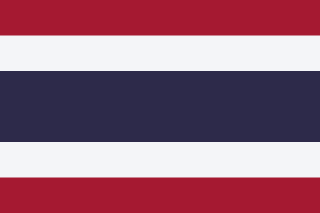
Thailand, officially the Kingdom of Thailand and historically known as Siam, is a country in Southeast Asia on the Indochinese Peninsula. With a population of almost 70 million, it spans 513,120 square kilometres (198,120 sq mi). Thailand is bordered to the north by Myanmar and Laos, to the east by Laos and Cambodia, to the south by the Gulf of Thailand and Malaysia, and to the west by the Andaman Sea; it also shares maritime borders with Vietnam to the southeast, and Indonesia and India to the southwest. Bangkok is the nation's capital and largest city.

The Royal Thai Armed Forces (RTARF) are the armed forces of the Kingdom of Thailand.

Bangkok, officially known in Thai as Krung Thep Maha Nakhon and colloquially as Krung Thep, is the capital and most populous city of Thailand. The city occupies 1,568.7 square kilometres (605.7 sq mi) in the Chao Phraya River delta in central Thailand and has an estimated population of 10.539 million as of 2020, 15.3 per cent of the country's population. Over 14 million people lived within the surrounding Bangkok Metropolitan Region at the 2010 census, making Bangkok an extreme primate city, dwarfing Thailand's other urban centres in both size and importance to the national economy.

Sexuality and gender identity-based cultures are subcultures and communities composed of people who have shared experiences, backgrounds, or interests due to common sexual or gender identities. Among the first to argue that members of sexual minorities can also constitute cultural minorities were Adolf Brand, Magnus Hirschfeld, and Leontine Sagan in Germany. These pioneers were later followed by the Mattachine Society and the Daughters of Bilitis in the United States.

Thai Chinese, Thais of Chinese origin are Chinese descendants in Thailand. Thai Chinese are the largest minority group in the country and the largest overseas Chinese community in the world with a population of approximately 7-10 million people, accounting for 11–14% of the total population of the country as of 2012. It is also the oldest and most prominently integrated overseas Chinese community, with a history dating back to the 1100s. Slightly more than half of the ethnic Chinese population in Thailand trace their ancestry to Chaoshan. This is evidenced by the prevalence of the Teochew dialect among the Chinese community in Thailand as well as other Chinese languages. The term as commonly understood signifies those whose ancestors immigrated to Thailand before 1949.
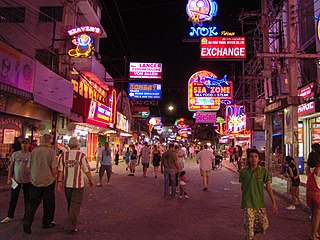
Prostitution in Thailand is illegal. However, due to police corruption and an economic reliance on prostitution dating back to the Vietnam War, it remains a significant presence in the country. It results from poverty, low levels of education and a lack of employment in rural areas. Prostitutes mostly come from the northeastern (Isan) region of Thailand, from ethnic minorities or from neighbouring countries, especially Cambodia, Myanmar, and Laos. UNAIDS in 2019 estimated the total population of sex workers in Thailand to be 43,000.
Chin Sophonpanich was a Thai entrepreneur who founded Bangkok Bank and Bangkok Insurance.
The Bangkok Conference was a conference held on 23 June 1942 by Indian Nationalist groups and local Indian Independence leagues at Bangkok to proclaim the formation of the All-India Independence league. The conference further saw the adoption by the league of a thirty-four set resolution known as the Bangkok resolutions that attempted to define the role of the league in the Independence movement, relations with the nascent Indian National Army, and clarify the grounds and conditions for obtaining Japanese support for it. The resolution further attempted to clarify the relations of Japan and the Greater East Asia Co-Prosperity Sphere with a free India.
The Indian National Council was an organisation founded in December 1941 in Bangkok by Indian Nationalists residing in Thailand. The organisation was founded from the Thai-Bharat Cultural Lodge on 22 December 1941. The founding president of the Council was Swami Satyananda Puri, along with Debnath Das as the founding secretary. Along with the Indian Independence League, it came to be one of the two prominent Indian associations that corresponded with I Fujiwara's F Kikan on the scopes of Japanese assistance to the Indian movement.

Radical lesbianism is a lesbian movement that challenges the status quo of heterosexuality and mainstream feminism. It arose in part because mainstream feminism did not actively include or fight for lesbian rights. The movement was started by lesbian feminist groups in the United States in the 1950s and 1960s. A Canadian movement followed in the 1970s, which added momentum. As it continued to gain popularity, radical lesbianism spread throughout Canada, the United States, and France. The French-based movement, Front des Lesbiennes Radicales, or FLR, organized in 1981 under the name Front des Lesbiennes Radicales. Other movements, such as Radicalesbians, have also stemmed off of the larger radical lesbianism movement. In addition to being associated with social movements, radical lesbianism also offers its own ideology, similar to how feminism functions in both capacities.
The International Lesbian Information Service (ILIS) was an international organization which aimed at fostering international lesbian organizing. It was started within ILGA in 1980. The following year, at a separate lesbian conference arranged prior to the ILGA Turin conference, lesbian organizations decided that ILIS should become a separate organization.

Dhammananda Bhikkhuni, born Chatsumarn Kabilsingh or Chatsumarn Kabilsingh Shatsena, is a Thai bhikkhuni. On 28 February 2003, Kabilsingh received full monastic ordination as a bhikkhuni of the Theravada tradition in Sri Lanka. She is Abbess of Songdhammakalyani Monastery, the only temple in Thailand where there are bhikkhunis.
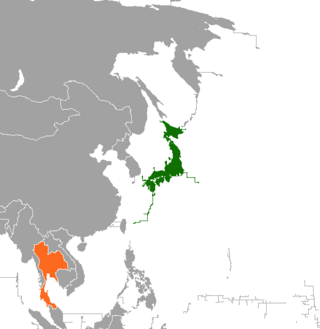
Japan–Thailand relations refer to bilateral relations between Japan and Thailand. Contacts had an early start with Japanese trade on Red seal ships and the installation of Japanese communities on Siamese soil, only to be broken off with Japan's period of seclusion. Contacts resumed in the 19th century and developed to the point where Japan is today one of Thailand's foremost economic partners. Thailand and Japan share the distinction of never having lost sovereignty to the European powers during the colonial period, and both countries were Axis partners during the later part of World War II.

Sri Maha Mariamman Temple, also known as Maha Uma Devi Temple (Thai: วัดพระศรีมหาอุมาเทวี; RTGS: Wat Phra Si Maha Umathewi and Wat Khaek in Thai, is a South Indian architecture style Hindu temple on Si Lom Road in Bangkok, Thailand. It was built in 1879 by Vaithi Padayatchi, a Tamil Hindu immigrant.
In Thailand, as elsewhere, one can find several different gender roles, identities and diverse visual markers of masculinity and femininity. The demand for positive self-identity is growing in Thailand and support is growing.
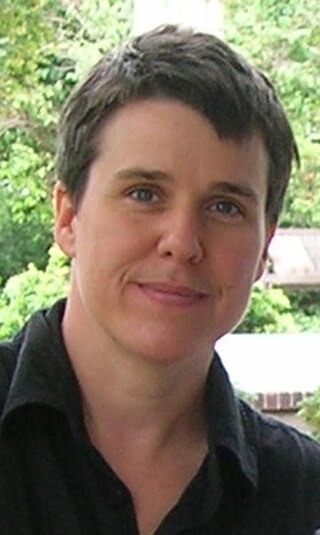
Ara Wilson is a university professor and author.
The World Sanskrit conference is an international conference organised at various locations globally. It has been held in North America, Europe, Asia and Australia. The Delhi International Sanskrit Conference of 1972 is considered to be the first World Sanskrit Conference. So far it has been held in India four times.
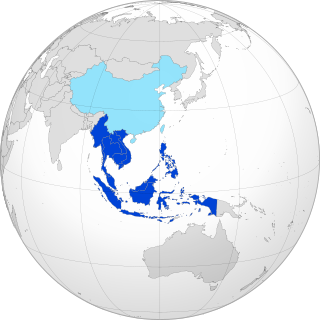
The Bamboo network or the Chinese Commonwealth is used to conceptualize the links between businesses run by Overseas Chinese in Southeast Asia. It links the Overseas Chinese business community of Southeast Asia, namely Malaysia, Indonesia, Singapore, Thailand, Vietnam, the Philippines, and Myanmar with the economies of Greater China. Overseas Chinese companies in Southeast Asia are usually managed as family businesses in a centralized bureaucratic manner. In an article in The New York Review of Books, Indian critic Pankaj Mishra called it a "largest economic force in Asia outside of Japan".
Anjaree was an LGBT rights organization in Thailand. It formed as a lesbian organization in 1986 and has focused on issues such as reforming the words used to refer to same sex desire and campaigning for same sex marriage to be legally recognised. It became dormant around 2011.
This is a timeline of notable events in the history of non-heterosexual conforming people of Asian and Pacific Islander ancestry, who may identify as LGBTIQGNC, men who have sex with men, or related culturally-specific identities. This timeline includes events both in Asia and the Pacific Islands and in the global Asian and Pacific Islander diaspora, as the histories are very deeply linked. Please note: this is a very incomplete timeline, notably lacking LGBTQ-specific items from the 1800s to 1970s, and should not be used as a research resource until additional material is added.
References
- 1 2 3 Zimmerman, Bonnie. "Asian Lesbian Network", Lesbian Histories and Cultures, Routledge, 2000 pp. 75–76. ISBN 978-0-8153-1920-7
- ↑ Thongthiraj, Took Took (1996). "Toward a Struggle against Invisibility: Love between Women in Thailand". Asian American Sexualities: Dimensions of the Gay and Lesbian Experience. New York: Routledge. p. 167. ISBN 978-0-415-91437-6.